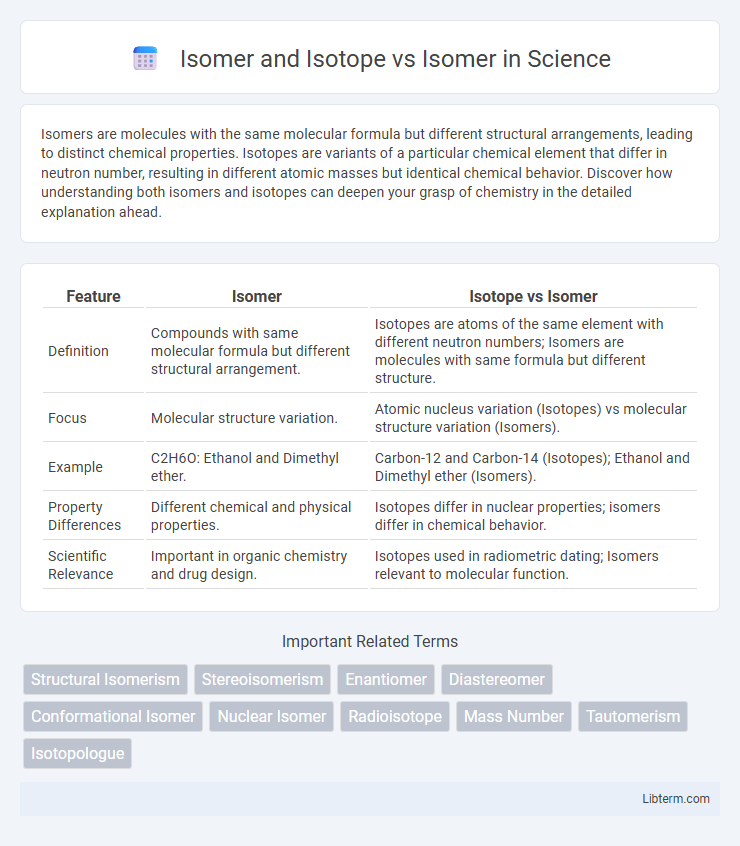Isomers are molecules with the same molecular formula but different structural arrangements, leading to distinct chemical properties. Isotopes are variants of a particular chemical element that differ in neutron number, resulting in different atomic masses but identical chemical behavior. Discover how understanding both isomers and isotopes can deepen your grasp of chemistry in the detailed explanation ahead.
Table of Comparison
| Feature | Isomer | Isotope vs Isomer |
|---|---|---|
| Definition | Compounds with same molecular formula but different structural arrangement. | Isotopes are atoms of the same element with different neutron numbers; Isomers are molecules with same formula but different structure. |
| Focus | Molecular structure variation. | Atomic nucleus variation (Isotopes) vs molecular structure variation (Isomers). |
| Example | C2H6O: Ethanol and Dimethyl ether. | Carbon-12 and Carbon-14 (Isotopes); Ethanol and Dimethyl ether (Isomers). |
| Property Differences | Different chemical and physical properties. | Isotopes differ in nuclear properties; isomers differ in chemical behavior. |
| Scientific Relevance | Important in organic chemistry and drug design. | Isotopes used in radiometric dating; Isomers relevant to molecular function. |
Introduction to Isomers and Isotopes
Isomers are molecules with the same molecular formula but different structural arrangements, leading to distinct chemical properties, while isotopes are atoms of the same element that differ in neutron number but share identical proton counts. Isomers can include structural isomers and stereoisomers, each impacting molecular behavior and reactivity differently. Isotopes, such as carbon-12 and carbon-14, are essential in fields like radiometric dating and medical imaging due to their nuclear differences.
Defining Isomers: Types and Examples
Isomers are molecules with the same molecular formula but different structural arrangements, significantly affecting their chemical properties and functions. Common types include structural isomers, such as butanol and isobutanol, which differ in connectivity, and stereoisomers, like cis-trans isomers and enantiomers, which differ in spatial orientation. Unlike isotopes, which are variants of elements differing only in neutron number, isomers represent variations in molecular structure rather than atomic composition.
Understanding Isotopes: Structure and Significance
Isotopes are variants of a chemical element that share the same number of protons but differ in their neutron count, resulting in distinct atomic masses; this structural difference significantly influences their nuclear stability and radioactive behavior. Isomers, in contrast, are molecules or ions with the same atomic composition yet differ in the arrangement or energy state of their nuclei or electrons, impacting their chemical and physical properties without altering atomic mass. Understanding isotopes is crucial in fields such as radiometric dating, medical imaging, and nuclear energy, where their unique nuclear characteristics play a vital role.
Isomers vs Isotopes: Key Differences
Isomers and isotopes are distinct chemical concepts critical to molecular and atomic structure understanding. Isomers are molecules with the same molecular formula but different structural arrangements, affecting their chemical properties and reactivity. Isotopes, on the other hand, are variants of a particular chemical element with the same number of protons but different numbers of neutrons, resulting in different atomic masses and nuclear properties.
Chemical Properties of Isomers
Isomers possess identical molecular formulas but differ in the arrangement of atoms, leading to distinct chemical properties such as reactivity and polarity. In contrast, isotopes share the same chemical structure but vary in neutron number, affecting only atomic mass and nuclear properties without altering chemical behavior. Understanding these differences is essential for applications in pharmaceuticals, materials science, and nuclear chemistry.
Nuclear Properties of Isotopes
Isomers and isotopes differ fundamentally in nuclear properties, with isotopes having the same number of protons but differing neutron counts, resulting in variations in nuclear stability and radioactivity. Nuclear isomers are excited states of a specific isotope, exhibiting distinct energy levels and decay modes without changing the atomic number or mass number. The study of nuclear isomers reveals metastable states crucial for applications in nuclear medicine and energy storage, while isotopes underpin radiometric dating and nuclear fission processes.
Applications of Isomers in Industry and Research
Isomers, molecules with identical molecular formulas but different arrangements of atoms, play a crucial role in pharmaceuticals, where stereoisomers can dramatically influence drug efficacy and safety. In the chemical industry, positional and structural isomers are exploited to optimize materials like plastics and synthetic fuels, enhancing performance and sustainability. Research applications utilize isomers to study reaction mechanisms and develop new catalysts, driving innovation in synthetic chemistry and material science.
Uses of Isotopes in Science and Medicine
Isotopes, variants of elements differing in neutron number, play crucial roles in science and medicine, including radiometric dating, tracing biochemical pathways, and medical imaging techniques like PET scans. Isomers, though structurally distinct molecules with identical formulas, are primarily studied in chemistry for their different physical and chemical properties. The unique radioactive and stable isotopes enable targeted cancer treatments and diagnostic procedures, making isotopes indispensable in modern healthcare and research.
Structural vs Nuclear Variation: Comparative Analysis
Isomers are compounds with identical molecular formulas but different structural arrangements, resulting in diverse chemical properties due to variations in atomic connectivity. Isotopes are variants of the same element with different neutron counts, causing nuclear differences that alter atomic mass without changing chemical behavior significantly. This comparative analysis highlights that isomers exhibit structural variation impacting chemical reactivity, whereas isotopes demonstrate nuclear variation influencing physical attributes and nuclear stability.
Conclusion: Isomers and Isotopes in Modern Chemistry
Isomers and isotopes play crucial roles in modern chemistry by illustrating variations in molecular structure and atomic composition, respectively. Isomers share the same molecular formula but differ in the arrangement of atoms, impacting chemical properties and reactivity, while isotopes possess the same atomic number with varying neutron counts, affecting atomic mass and nuclear stability. Understanding these differences enables chemists to manipulate substances for targeted applications, such as drug design and radiometric dating, highlighting their importance in scientific research and practical innovation.
Isomer and Isotope Infographic

 libterm.com
libterm.com